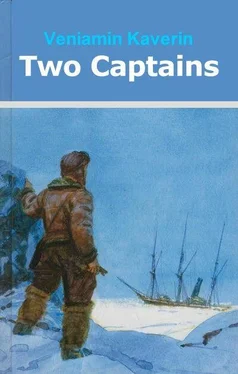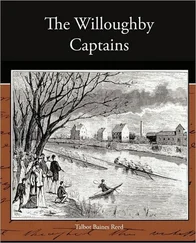And how handy she was at housekeeping, and she only seven, mind you! Of course, running the house was a simple affair-in one corner of the attic lay potatoes, in another beets, cabbages, onions and salt. For bread we went to Petrovna's.
So there we were, two children in an empty house, in a remote snowed-up village. Every morning we used to tread a path in the snow to Petrovna's cottage. Only in the evenings did we feel a bit scared. It was so quiet you could almost hear the soft sound of the falling snow, and amidst this stillness the wind would suddenly start moaning in the chimney.
Chapter Five
DOCTOR IVAN IVANOVICH. I LEARN TO SPEAK
Then one evening, when we had just gone to bed and my sister had just fallen silent, dropping off to sleep as she always did with the last uttered word, and that saddening hush fell upon the world, with the wind beginning to moan in the chimney, I heard a tap on the window.
A tall bearded man in a sheepskin coat and cap with ear-flaps stood there; he was so stiff with cold that when I lit the lamp and let him in he could not even close the door behind him. Screening the light with my hand, I noticed that his nose was quite white-frost-nipped. He bent to take off his knapsack and suddenly sat down on the floor.
That was how he first appeared before me, the man I am indebted to for being able to write this story-frozen almost to death, crawling towards me on all fours. He tried to put his trembling fingers into his mouth, and sat on the floor breathing heavily. I started to help him off with his coat. He muttered something and slumped over on his side in a dead faint.
I had once seen Mother lying in a faint and Aunt Dasha had breathed into her mouth. I did exactly the same now. My visitor was lying by the warm stove and I don't know what it was in the end that brought him round; I only knew that I blew like mad till I felt dizzy. However that may be, he came to, sat up and began warming himself up vigorously. The colour returned to his nose. He even attempted a smile when I poured him out a mug of hot water.
"Are you children alone here?"
Before Sanya could answer "Yes," the man was asleep. He dropped off so suddenly that I was afraid he had died. But as though in answer to my thoughts he started to snore.
He came round properly the next day. I woke up to find him sitting on the stove ledge with my sister and they were talking. She already knew that his name was Ivan Ivanovich, that he had lost his way, and that we were not to say a word about him to anyone, otherwise they'd put him in irons. I remember that my sister and I grasped at once that our visitor was in some sort of danger and we tacitly decided never to breathe a word about him to anyone. It was easier for me, of course, to keep quiet, than it was for Sanya.
Ivan Ivanovich sat on the stove ledge with his hands tucked under him, listening while she chattered away. He had been told everything: that Father had been put in prison, that we handed in a petition, that Mother had brought us here and gone back to town, that I was dumb, that Grandma Petrovna lived here-second house from the well-and that she, too, had a beard, only it was smaller and grey.
"Ah, you little darlings," said Ivan Ivanovich, jumping down from the stove.
He had light-coloured eyes, but his beard was black and smooth. At first I thought it strange that he made so many unnecessary gestures; it seemed as if at any moment he would reach for his ear round the back of his head or scratch the sole of his foot. But I soon got used to him. When talking, he would suddenly pick something up and begin tossing it in the air or balancing it on his hand like a juggler.
"I say, children, I'm a doctor, you know," he said one day. "You just tell me if there's anything wrong with you. I'll put you right in a tick."
We were both well, but for some reason he refused to go and see the village elder, whose daughter was sick.
But in such a position
I'm in a terrible funk
In case the Inquisition
Is tipped off by the monk,
he said with a laugh,
It was from him that I first heard poetry. He often quoted verses, sometimes even sang them or muttered them, his eyebrows raised as he squatted before the fire Turkish fashion.
At first he seemed pleased that I couldn't ask him anything, especially when he woke up in the night at the slightest sound of steps outside the window and lay for a long time leaning on his elbow, listening. Or when he hid himself in the attic and sat there till dark-he spent a whole day there once, I remember. St. George's Day it was. Or when he refused to meet Petrovna.
But after two or three days he became interested in my dumbness.
"Why don't you speak? Don't you want to?"
I looked at him in silence.
"I tell you, you must speak. You can hear, so you ought to be able to speak. It's a very rare case yours-I mean being dumb but not deaf. Maybe you're deaf and dumb?"
I shook my head.
"In that case we're going to make you speak."
He took some instruments from his knapsack, complained about the light being poor, though it was a bright sunny day, and started fiddling about with my ear.
"Ear vulgaris," he remarked with satisfaction. "An ordinary ear."
He withdrew to a corner and whispered: "Sap."
"Did you hear that?"
I laughed.
"You've got a good ear, like a dog's." He winked at Sanya who was staring at us open-mouthed. "You can hear splendidly. Why the dickens don't you speak then?"
He took my tongue between his finger and thumb and pulled it out so far that I got frightened and made a croaky sound.
"What a throat you have, my dear chap! A regular Chaliapin. Well, well!"
He looked at me for a minute, then said gravely: "You'll have to learn, old chap. Can you talk to yourself at all? In your mind?"
He tapped my forehead.
"In your head-get me?"
I mumbled an affirmative.
"What about saying it aloud then? Say out loud whatever you can.' Now, then, say 'yes'."
I could hardly say anything. Nevertheless I did bring out a "yes".
"Fine! Try again."
I said it again.
"Now whistle."
I whistled.
"Now say 'oo'."
I said "oo".
"You're a lazybones, that's what the matter with you! Now, then, repeat after me…"
He did not know that I spoke everything in my mind. I'm sure that's the reason why I have remembered my earliest years so distinctly. But my dumb mental speech fell far short of all those "ees", '"os" and "yoos", of all those unfamiliar movements of lips, tongue and throat in which the simplest words got stuck. I managed to repeat after him separate sounds, chiefly vowel sounds, but putting them together and uttering them smoothly, without "barking", the way he bade me, was some job.
Three words I coped with at once: they were "ear", "mamma" and "stove". It was as if I had pronounced them before and merely had to recall them. As a matter of fact that's how it was. Mother told that I had begun to speak at the age of two and then had suddenly gone dumb after an illness.
My teacher slept on the floor, slipping some shiny metallic object under his mattress and using his sheepskin coat as a blanket, but I kept tossing about, drinking water, sitting up in bed and gazing at the frostwork on the window. I was thinking of how I would go home and start talking to Mother and Aunt Dasha. I recollected the moment when I first realised that I couldn't speak: it was in the evening, and Mother thought I was asleep; pale, erect, with black plaits hanging down in front, she gazed at me for a long time. It was then that there first occurred to me the bitter thought that was to poison my early years: "I'm not as good as others, and she's ashamed of me."
I kept repeating "ее", "о", "уоо" all night, too happy to go to sleep I did not doze off until dawn. Sanya woke me when the day was full.
Читать дальше












